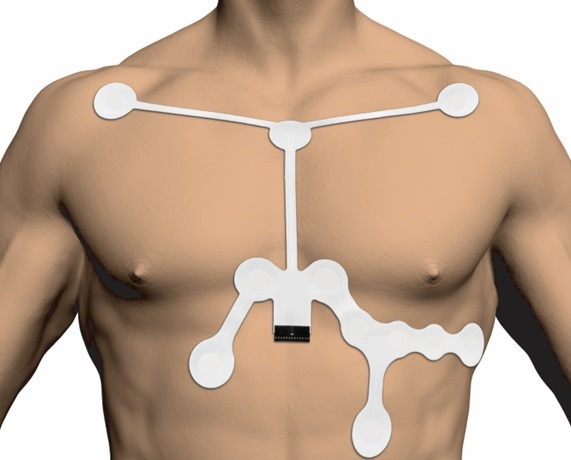Portable and Wireless EKG patch as Effective as Traditional Stationary Device
|
By HospiMedica International staff writers Posted on 15 Nov 2024 |

Each year, over 300 million electrocardiograms (EKGs) are performed worldwide, with a third of them performed in the United States. Despite their widespread use, the technology behind EKGs has remained largely unchanged for decades. Now, a study has demonstrated that a newly developed wireless EKG patch is just as accurate, if not more so, than traditional EKG machines.
Researchers at the University of Cincinnati College of Medicine (Cincinnati, OH, USA) tested the EKG Patch Solution, a device developed by MG Medical Products (Cincinnati, OH, USA). This innovative patch features an all-in-one design with built-in lead wires and pre-positioned electrodes, simplifying the process of attaching it to the chest and reducing the risk of electrode misplacement. This design helps ensure more accurate readings of the heart’s electrical activity. The EKG Patch Solution was tested in a prospective, single-blind study involving 200 heart patients, comparing it to the standard 12-lead EKG procedure.
The study found that errors affecting the interpretability of the EKG occurred in 6.5% of Patch EKG procedures and 15% of traditional EKG procedures. These errors were mainly attributed to patient movement, according to the findings published in Clinical Research in Cardiology. When asked about their preferences, 47% of participants favored the Patch EKG, while 52% had no preference between it and the standard method. The wireless Patch EKG has the potential to revolutionize how EKGs are conducted, offering particular benefits for skilled nursing, behavioral health, and correctional facilities. Its ability to quickly assess acute cardiac symptoms could help reduce hospital readmission rates for individuals in these settings.
“It’s five pounds, you don’t have to wheel the machine in, you don’t have to untangle wires, you don’t have to get people dirty,” said Jeff McGrath, president of MG Medical Products. “You don’t have to have a technical skill to acquire this. People take classes for months to learn how to operate a traditional EKG. You take a class for 20 minutes with this new product to learn how to do an EKG.”
Related Links:
MG Medical Products
Latest Critical Care News
- Mass Manufactured Nanoparticles to Deliver Cancer Drugs Directly to Tumors
- World’s Smallest Pacemaker Fits Inside Syringe Tip

- AI-Powered, Internet-Connected Medical Devices to Revolutionize Healthcare, Finds Study
- Starfish-Inspired Wearable Tech Enables Smarter Heart Monitoring
- AI Eye Scans Could Help Identify Heart Disease and Stroke Risk
- Digital Heart Twin Improves Diagnosis and Treatment of Cardiac Arrhythmias
- First-Of-Its-Kind AI-Powered Probability Scoring System Assesses Heart Failure with Preserved Ejection Fraction
- AI-Assisted Colonoscopy Detects More Polyps but Has Modest Effect on Cancer Risk
- Wearables Could Reduce Need for Continuous Blood Thinners in Patients with Atrial Fibrillation
- AI Model Provides Real-Time Sepsis Risk Alerts for Improving ICU Patient Survival
- AI Algorithm Improves Intravenous Nutrition for Premature Babies
- Smart Mirror Generates AI-Powered Health Insights by Analyzing Facial Blood Flow
- Painless Diabetes Patch to Replace Needle Pricks

- Sensory T-Shirt Monitors Patient’s Vitals After Urological Surgery for Cancer
- Super-Sensitive Radar Technology Warns of Serious Heart Issues
- Thermal Imaging Could Accurately Track Vital Signs for Early Disease Detection
Channels
Surgical Techniques
view channel
New Transcatheter Valve Found Safe and Effective for Treating Aortic Regurgitation
Aortic regurgitation is a condition in which the aortic valve does not close properly, allowing blood to flow backward into the left ventricle. This results in decreased blood flow from the heart to the... Read more
Minimally Invasive Valve Repair Reduces Hospitalizations in Severe Tricuspid Regurgitation Patients
The tricuspid valve is one of the four heart valves, responsible for regulating blood flow from the right atrium (the heart's upper-right chamber) to the right ventricle (the lower-right chamber).... Read morePatient Care
view channel
Portable Biosensor Platform to Reduce Hospital-Acquired Infections
Approximately 4 million patients in the European Union acquire healthcare-associated infections (HAIs) or nosocomial infections each year, with around 37,000 deaths directly resulting from these infections,... Read moreFirst-Of-Its-Kind Portable Germicidal Light Technology Disinfects High-Touch Clinical Surfaces in Seconds
Reducing healthcare-acquired infections (HAIs) remains a pressing issue within global healthcare systems. In the United States alone, 1.7 million patients contract HAIs annually, leading to approximately... Read more
Surgical Capacity Optimization Solution Helps Hospitals Boost OR Utilization
An innovative solution has the capability to transform surgical capacity utilization by targeting the root cause of surgical block time inefficiencies. Fujitsu Limited’s (Tokyo, Japan) Surgical Capacity... Read more
Game-Changing Innovation in Surgical Instrument Sterilization Significantly Improves OR Throughput
A groundbreaking innovation enables hospitals to significantly improve instrument processing time and throughput in operating rooms (ORs) and sterile processing departments. Turbett Surgical, Inc.... Read moreHealth IT
view channel
Printable Molecule-Selective Nanoparticles Enable Mass Production of Wearable Biosensors
The future of medicine is likely to focus on the personalization of healthcare—understanding exactly what an individual requires and delivering the appropriate combination of nutrients, metabolites, and... Read more
Smartwatches Could Detect Congestive Heart Failure
Diagnosing congestive heart failure (CHF) typically requires expensive and time-consuming imaging techniques like echocardiography, also known as cardiac ultrasound. Previously, detecting CHF by analyzing... Read morePoint of Care
view channel
Handheld, Sound-Based Diagnostic System Delivers Bedside Blood Test Results in An Hour
Patients who go to a doctor for a blood test often have to contend with a needle and syringe, followed by a long wait—sometimes hours or even days—for lab results. Scientists have been working hard to... Read moreBusiness
view channel
Expanded Collaboration to Transform OR Technology Through AI and Automation
The expansion of an existing collaboration between three leading companies aims to develop artificial intelligence (AI)-driven solutions for smart operating rooms with sophisticated monitoring and automation.... Read more


















